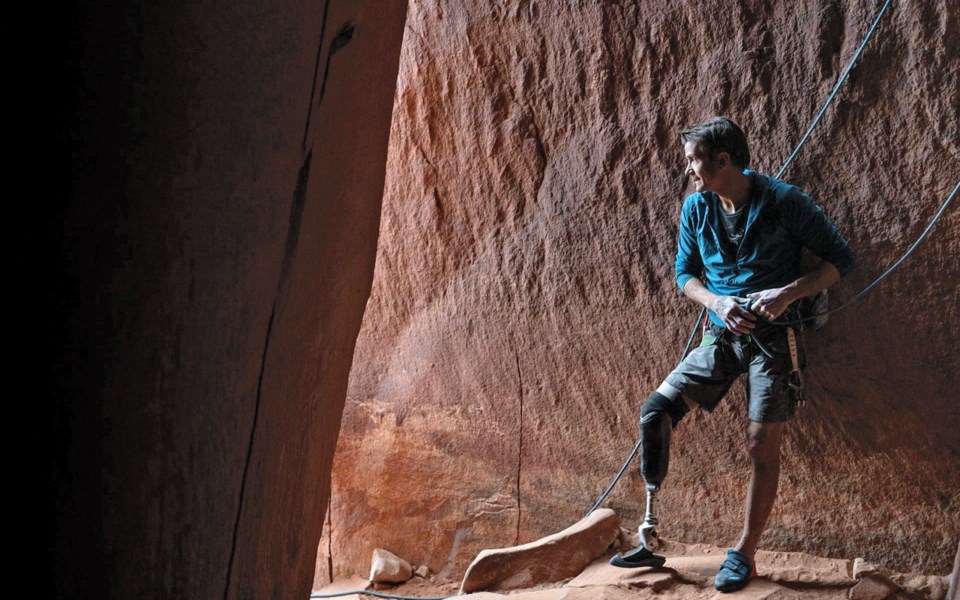It's an ugly truth. When I first encountered climber Craig DeMartino, I felt a little bit sorry for him. He was inspiring, for sure. Remarkable in his resilience, absolutely. But, with his right leg amputated below the knee, I saw the absence more than his remarkable presence.
DeMartino was a professional climber and one of the session guides brought to Squamish by Arc'teryx for last summer's Climbing Academy. (He returns with the Squamish Climbing Academy this weekend, Aug. 22 to 25.) If I articulated a thought at all as he walked past, fit and strong and with barely a hitch to his gait, my eyes sliding sideways to avoid staring as I wanted to, the thought would have been, "Isn't that so inclusive of Arc'teryx?" Me and my "able body" and my less-than way of thinking, so deeply patronizing.
A few months later, I had the chance to talk with DeMartino for a project we were both engaged on for Arc'teryx. As we back-and-forthed about empathy, design, climbing prosthetics, goats, navigating airport security, he became fully fleshed out, a human, not a caricature, and my less-than thinking whooshed away. I don't climb the grades he climbs at, but as DeMartino said, "The beauty of climbing is that you can be a 5.6 climber and get the same thing somebody climbing 5.14 does. It's the same, the mechanism is the same." We shared a common language.
Last week, I squared up to a rough granodiorite wall, feeling out of shape, rusty, confronted by a season of low activity. I studied the rock, thinking about my first few moves, how to shift from the horizontal world to the vertical one as smoothly as possible. And DeMartino's words came back to me: "Climbing is about working with imperfections in the rock."
Rock is a medium I love to interact with—the cool smell of it on my fingers, its textures, its variability. Over aeons, water, and other factors, have worn and shaped and created features in rock walls. You can't interact with polished flawless granite. (You get smashed by it, as anyone who has ever slammed their favourite coffee cup down too hard on their unforgiving countertop well knows.) But where there are fissures and flakes and scars and pieces that have fallen away over the years, you have the chance of a meaningful encounter.
I have easily oppressed myself with the idea that there is an Ur-Climber physique, a body as impervious as granite that lends itself to the power, grace, and strength the sport requires, a perfection I smash my self-esteem up against quite regularly. I'd be a better climber if I had a more perfect climber-body, I thought. Until DeMartino said, "Climbing is really about working with imperfection." The imperfection in the rock is what we seek out. But his gracious way of looking at the imperfections in ourselves, physically, let me settle, finally, into the wonder of my own imperfect physical form.
At 54, DeMartino is in incredible shape. He's led the first all-disabled ascent of Yosemite National Park's El Capitan, and is the first amputee to climb El Cap in under 34 hours. He returned to climbing after surviving a near-fatal ground-fall in 2002, knowing he was a different person, physically and mentally, than he had been before the accident, willing to explore what that might look like. He had to learn to navigate the changes in his body and mind, and out of that hard-won learning, he developed the empathy and skillset with which to offer adaptive climbing clinics to help people recover from trauma, to ask themselves, how can I work with this imperfection? How can I adapt? How can I turn this to my advantage?
"Climbing is what helped me," said DeMartino, "so now I introduce people who have gone through heavy trauma to climbing. They're trying to figure out what their new body is doing or what it will do. I try to help uncover that. I'm guiding them not really as a climbing guide. It's more, 'Hey, your life is totally different now, but that doesn't mean it's bad. It just means it's totally different. So what does that look like on a daily basis?'"
What can climbing do? Climbing teaches anyone who steps up to the vertical wall how to try hard. How to take your time. How to be efficient. How to be present.
"It's easy when you've gone through trauma to get caught up in this circle of 'it hurts, and nobody understands, and nobody lets me do anything,'" reflects DeMartino. That's where he intervenes, because the same traits that make you successful climbing, can make you successful after heavy trauma. (Or mild trauma. Or garden-variety, self-esteem wobbles.) You practice adapting to imperfection, and every now and then, everything flows and the rush of that carries you through a hundred more shitty days.
"Because I've been in it for so long and understand my injuries, I can tell them, 'Yeah, it is sucky today, but tomorrow is going be totally different."
Because that's what climbing is like. That's what trauma is like. That's what life is like.
Out of shape, post-surgery, post-baby, torqued or tweaked or tired out, our bodies are not fixed in time. We are constantly adapting to imperfections. DeMartino gifted me with a way of looking that was far more generous and gracious than I had ever had, and I'll never feel sorry for him again. Nor for myself. Pity feeds on the presumption there is a perfect way. There is no perfect way. There's just accepting the invitation to participate with the bodies and minds that we have.
Adaptation is the skillset we most need for the now-future. How lucky when we find a teacher willing to show us the way.
The Velocity Project: how to slow the f*&k down and still achieve optimum productivity and life happiness.




